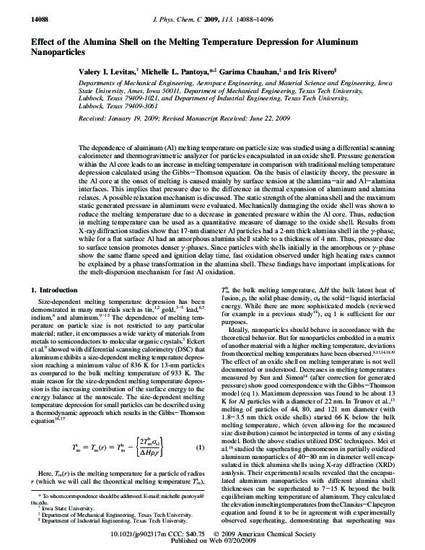
Article
Effect of the Alumina Shell on the Melting Temperature Depression for Aluminum Nanoparticles
The Journal of Physical Chemistry C
Document Type
Article
Disciplines
Publication Date
8-13-2009
DOI
10.1021/jp902317m
Abstract
The dependence of aluminum (Al) melting temperature on particle size was studied using a differential scanning calorimeter and thermogravitmetric analyzer for particles encapsulated in an oxide shell. Pressure generation within the Al core leads to an increase in melting temperature in comparison with traditional melting temperature depression calculated using the Gibbs−Thomson equation. On the basis of elasticity theory, the pressure in the Al core at the onset of melting is caused mainly by surface tension at the alumina−air and Al−alumina interfaces. This implies that pressure due to the difference in thermal expansion of aluminum and alumina relaxes. A possible relaxation mechanism is discussed. The static strength of the alumina shell and the maximum static generated pressure in aluminum were evaluated. Mechanically damaging the oxide shell was shown to reduce the melting temperature due to a decrease in generated pressure within the Al core. Thus, reduction in melting temperature can be used as a quantitative measure of damage to the oxide shell. Results from X-ray diffraction studies show that 17-nm diameter Al particles had a 2-nm thick alumina shell in the γ-phase, while for a flat surface Al had an amorphous alumina shell stable to a thickness of 4 nm. Thus, pressure due to surface tension promotes denser γ-phases. Since particles with shells initially in the amorphous or γ-phase show the same flame speed and ignition delay time, fast oxidation observed under high heating rates cannot be explained by a phase transformation in the alumina shell. These findings have important implications for the melt-dispersion mechanism for fast Al oxidation.
Copyright Owner
American Chemical Society
Copyright Date
2009
Language
en
File Format
application/pdf
Citation Information
Valery I. Levitas, Michelle L. Pantoya, Garima Chauhan and Iris Rivero. "Effect of the Alumina Shell on the Melting Temperature Depression for Aluminum Nanoparticles" The Journal of Physical Chemistry C Vol. 113 Iss. 32 (2009) p. 14088 - 14096 Available at: http://works.bepress.com/iris_rivero/1/

Posted with permission from Journal of Physical Chemistry C 113 (2009): 14088–14096, doi:10.1021/jp902317m. Copyright 2009 American Chemical Society.